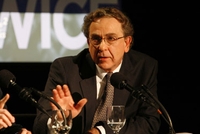In this engrossing, panoramic history of the development of American media, Pulitzer winner Starr (The Social Transformation of American Medicine
) ranges from our nation's founding, when the Constitution made the postal service the one nationalized industry and the Bill of Rights denied the federal government any role in regulating the press, to the eve of WWII, when commercial radio broadcasting flourished under very different cultural, political and economic conditions. Throughout, Starr shows that our country's original impulse to promote the postal service and press as part of its vision of nation building established a pattern of support for an open, continent-wide market that would assume different forms and policies as new waves of media were introduced. Starr brilliantly argues, however, that the government preference for keeping things decentralized was finally challenged by the advent of the telegraph, as its technology and associated economies of scale centralized the communications industry. Confronting thorny new issues of monopoly and threats to the guaranteed rights of free expression and individual privacy, the country then had no choice but to take on a regulatory role. Starr vividly demonstrates how complicated that role became with media like motion pictures and broadcasting, as the nation experienced immigration, urbanization and major cultural shifts: suddenly, counter forces in favor of moral regulation were petitioning the government to use all of its power to restrain mass media. The culture wars had begun. Agent, Bill Leigh.
(Apr. 15)
Forecast:
The striking parallels in Starr's sweeping and authoritative study to such current hot topics as the USA Patriot Act, FCC licensing procedures and the media role in political campaigns should draw the attention of serious readers. An author tour, national ad campaign and NPR coverage could expand interest further.


